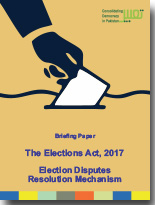Political Parties are an essential component of any democratic system and the foundation of a strong parliament. A very limited work has been done for the development of political parties in Pakistan. To optimise another successful democratic transition in 2018 and beyond, political parties must be supported and strengthened.
Tabeer-Consolidating Democracy in Pakistan (CDIP) is working to support the democratic processes in Pakistan by strengthening the capacity of the country’s institutions to be more effective, accountable and responsive to the needs of Pakistani people. The programme will achieve this by focusing on four interrelated areas: Elections, Parliament, Political Parties and Democratic Space.
To evaluate the current context for the provision of support, the Tabeer team conducted an assessment of the needs of political parties in Pakistan and carried out analysis of recent political party programmes in order to learn lessons and to focus on the gaps left. The assessment was aimed at examining the current state of major political parties – identifying areas in which the parties have begun to adopt reform measures and areas where further efforts are needed. During this exercise, Tabeer project team realised the need for improving the understanding of Political Party Officials on the Election Laws especially after the parliament passed a new Elections Act, 2017.
The team reached out to 13 selected political parties and briefed them on CDIP’s objectives. Responding to the need identified by political parties, Tabeer planned to develop a series of Briefing Papers on various aspects of the Elections Act, 2017 and organise roundtables and briefing-cum-training sessions for political party officials in a multi-party setting. This Briefing Paper is a part of the series of such papers and deals with the Election Dispute Resolution Mechanism as provided for in the Elections Act, 2017 for use by the leaders, office-bearers, candidates, polling agents and workers of the political parties. Using this paper, party officials will be briefed at a structured briefing-cum-training session and they will be expected, in turn, to train/brief their respective party colleagues.








